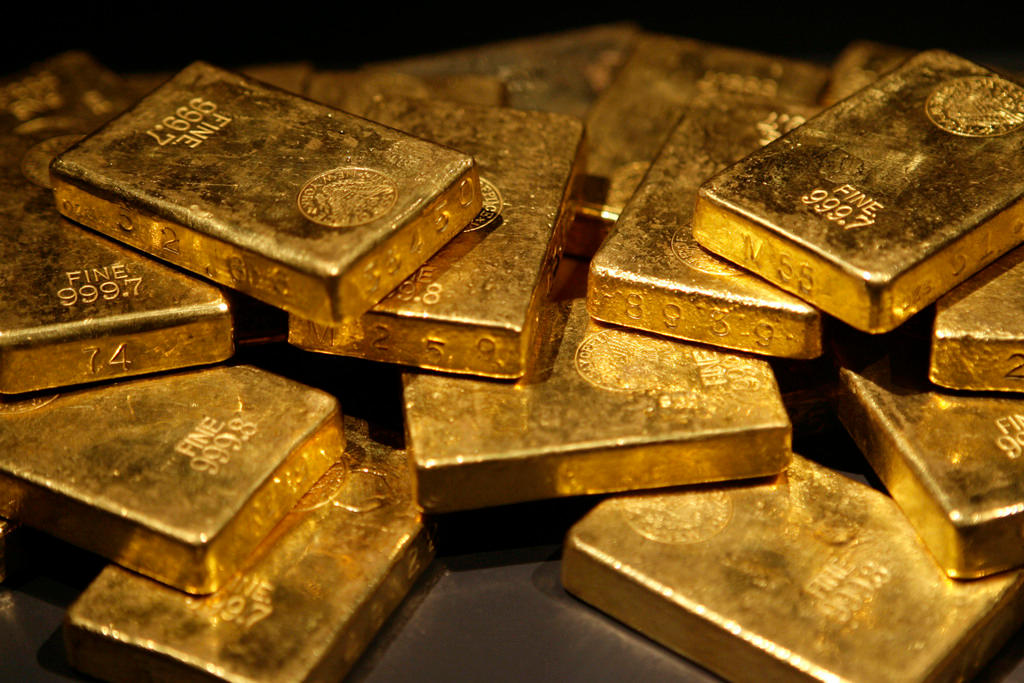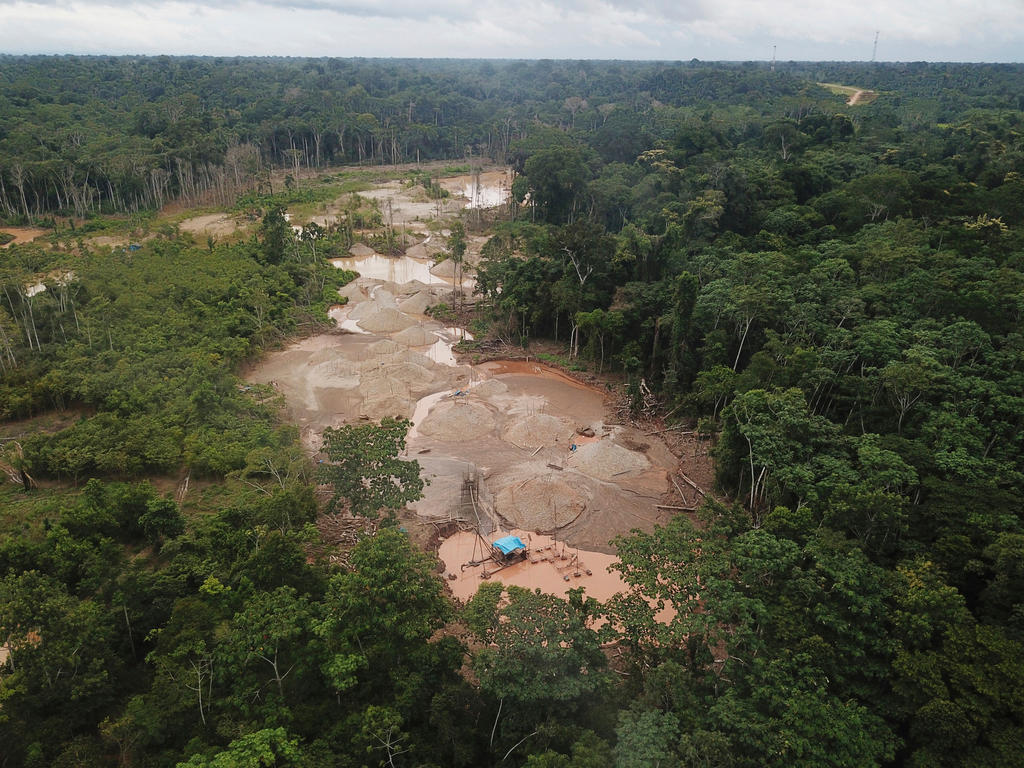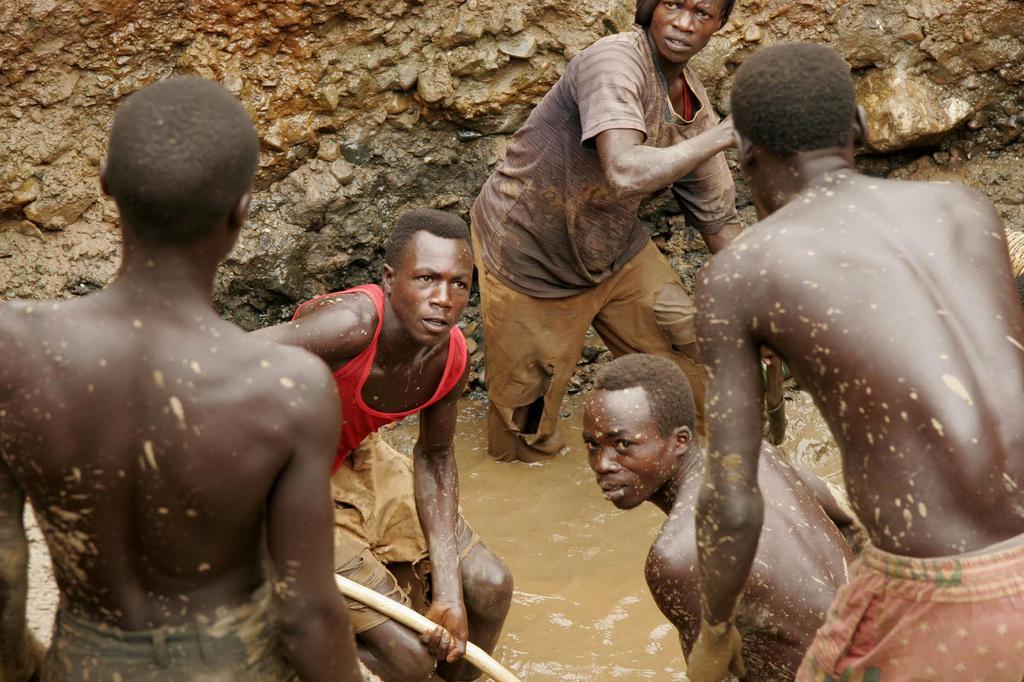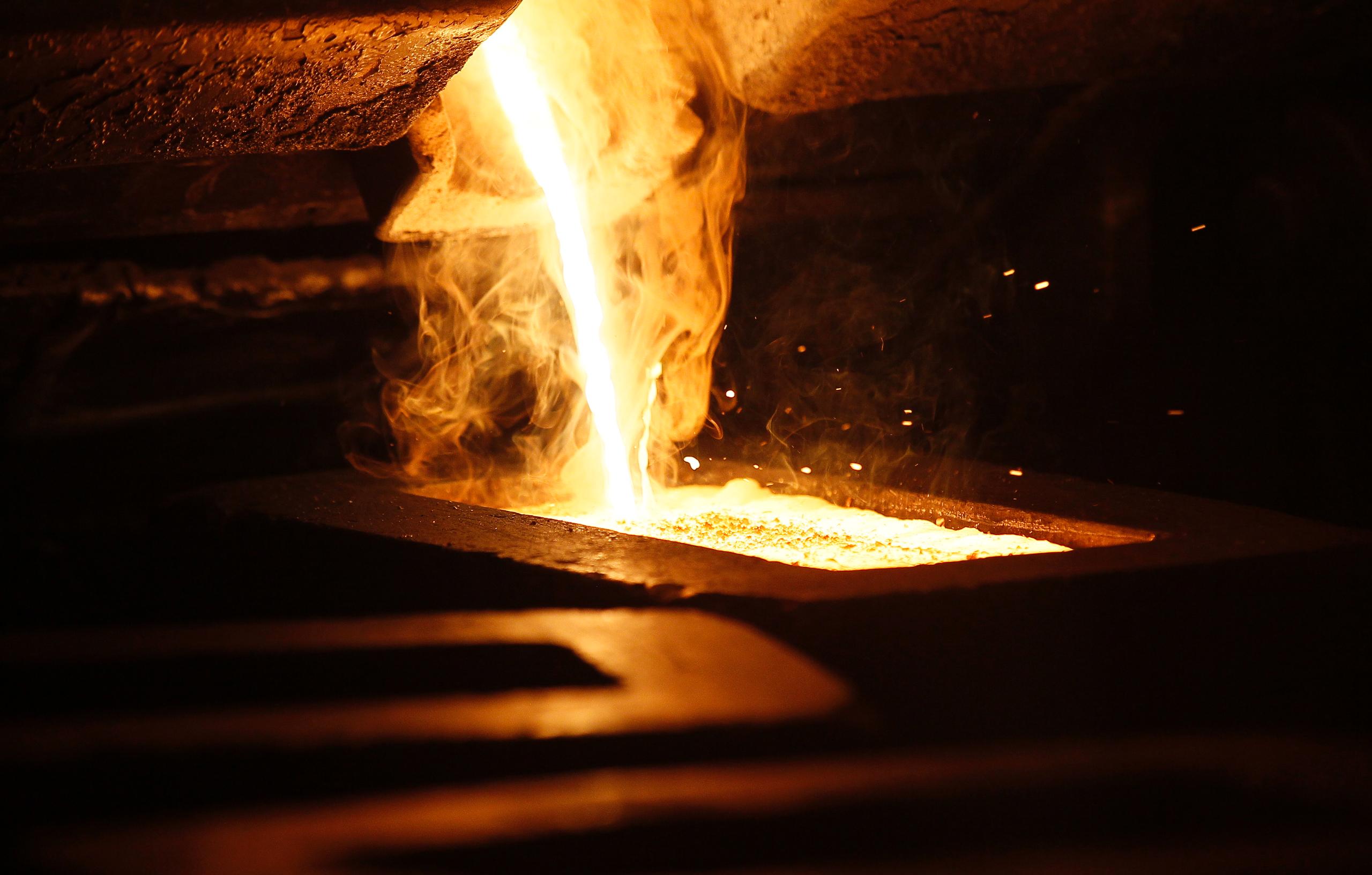The shady origins of gold refined in Switzerland

Most of the gold in the world passes through Switzerland. This is a business worth CHF70-90 billion ($70-90 billion) depending on the year. Gold arrives here in unrefined form, and leaves the country in all its glittering purity.
Sometimes, though, it is of highly dubious provenance. The government recognises the risk, which is why it recently issued a report on the subject. This report raises concerns over the exploitation of mine workers, and makes several recommendations to Swiss firms active in the field.
Swiss refineries process 70% of the unrefined gold mined in the world each year. Four of the nine major players in the global gold industry conduct most of their business here in Switzerland. While the gold originates in ninety different countries, roughly half of all the gold imported for processing in Switzerland comes from Britain, the United Arab Emirates or Hong Kong – three countries that produce no gold themselves.
Gold accounts for 63% of Britain’s exports to SwitzerlandExternal link, 92% of the Emirates’ and 78% of Hong Kong’s. But then too, Switzerland imports a significant amount of gold from countries that largely depend on it as a main export, such as Burkina FasoExternal link (where gold represents 72% of the country’s exports), GhanaExternal link (51%) and MaliExternal link (77%).
As can be seen from the accompanying chart, some of the main gold producers are countries not exactly known for respecting human rights. But looking at the second table, we also see that among the gold producers are several countries at war, which use the profits from gold to bankroll hostilities. In all these cases, the phrase used is “illegal gold” or “dirty gold” or even “blood gold”.
An important economic sector
To show just how important this sector is for the Swiss economy: in 2017, for example, 2404 metric tons of gold were imported, with a value of about CHF70 billion. In the same year Switzerland exported gold worth approximately CHF67 billion. In other words, 24% of Swiss exports and 31% of imports were directly linked to gold.
To compare this with the other “jewels in the crown” of Swiss industry: in the same period the country’s watchmakers made about CHF20 billion in exports, the equivalent about 24 million watches and clocks. Swiss chocolate makers exported just under CHF1 billion, or 128,000 tons of chocolate.
To match the achievements of the gold sector, these other industries would have to export 85 billion chocolate bars or 84 million watches and clocks. Only the pharmaceutical industry packs more economic weight: in 2017 the Swiss pharma giants exported goods to the value of CHF 98 billion.
Limited transparency
The trade in gold is worth one out of three Swiss franc’s worth of imports, and a quarter of a franc’s worth of exports. Not exactly peanuts, is it? The charts provided by the Observatory of Economic Complexity are instructive in this regard:
This is not a sector known for transparency. Far from it. There has been no lack of scandals over the years – from Peru to Togo (see story), via Burkina Faso and the Congo. In all these cases there has been talk of “blood gold” arriving from these countries in Switzerland to be refined. Then the gold in all its purity ends up in Britain, India, China and Hong Kong.
What is “blood gold”?
What exactly counts as “blood gold”? As the name implies, it’s gold stained with human blood, extracted in ways that fly in the face of human rights. “Bloody gold” also involves trampling of the rights of native peoples to self-determination and ownership of their ancestral lands.
Illegal mining of gold causes environmental damage, mainly due to pollution by heavy metals. Furthermore, gold mining often goes together with gun-running for local wars, organised crime, and money laundering.
Some of this gold has a way of getting to Switzerland for refining. The Swiss government has long been aware of this risk. In its report on the trade in gold published recently, it admits it cannot exclude the possibility that gold produced at the expense of human rights may be coming into Switzerland.
Blood gold – origin and traceability
In a joint statement, several of the Swiss NGOs active in campaigning for human rights agree that the government’s analysis pinpoints the major problems in this high-risk economic sector, but they find that the solutions proposed are inadequate.
One of the main problems is knowing where the gold actually comes from. More than half of all gold entering Switzerland comes from Britain, the United Arab Emirates and Hong Kong. These countries no more produce gold than does Switzerland itself. They are just the second-last stop on the journey of unrefined gold from other parts of the world.
Origin of gold
Gold represents 24% of Hong Kong’External links exports (about $30 billion), 16% of the United Arab Emirates External link($27 billion) and 4% of the United KingdomExternal link ($15 billion).
“Multinationals that refine gold in Switzerland know perfectly well where their raw materials are coming from,” say Marc Ummel, head of development policy in the raw materials sector at Swissaid. “They just don’t say it.”
While the federal government recognises in its report that the origins of gold need to be traceable, in practice the regulatory agencies just know the last country it came from, not the real country of origin.
For Ummel, the answer to the problem is simple. “We call on the government to require the Federal Customs Administration to find out the origin of goods arriving and not just the last country exporting them to Switzerland”.
Over the years, adds Ummel, the gold industry multinationals have been saying they want to improve the quality of information available. “But what does that mean? It would be enough just to declare the origin of the gold, what country, what mine it is coming from, and above all whether these mining operations pay heed to basic human rights and respect the environment. That would be improving the quality of information all right. But it isn’t happening.”
1) Responsible Gold GuidanceExternal link guidelines based on OECD guidelines on the duty of due diligence for a responsible mineral supply chain (including the fight against conflict gold, money laundering, terrorist financing).
2) Responsible Jewellery CouncilExternal link Certification: this certification aims to ensure responsible practices throughout the supply chain.
There is also the Better Gold Initiative (BGI)External link launched by Switzerland in 2013, which develops supply chains for responsible gold production.
Voluntary compliance
As the government’s own report says, Swiss refineries apply “voluntary” standards to ensure that production is in line with social and environmental considerations. But there is no obligation to comply.
The federal government itself endorses (but does not enforce) the standards developed by the OSCE and encourages (but does not compel) corporations to implement them.
The “Better Gold Initiative” (BGI) was launched by Switzerland in 2013 in Peru with a view to sourcing gold from small-scale mines that respect the voluntary sustainability guidelines. The project meant that from 2013 to 2017, some 2.5 tons of gold produced in a responsible manner were extracted and sold. It was certainly a laudable undertaking, but it represented no more than 0.015% of yearly world production.
Well-meaning but imperfect legislation
Swiss legislation already on the books is among the strictest in the world in regulating trade in gold, the federal government says. Laws on control of precious metals and combatting money-laundering aim to ensure that gold being processed in the refineries does not come from illegal mining.
Ummel does not share this view. “It’s not really true,” he says. “The European Union, even the US, have stricter laws. Swiss law does try to curb illegal gold mining, but, as the government admits, it does not have explicit provisions on respecting human rights.” Despite this admission, the federal government sees no need for new legislation in the matter.
Why this reluctance? Ummel has his theories. “The federal government talks about the tough international competition that the Swiss industry has to confront,” he notes. “So, not wishing to add to the difficulties of a sector involving one third of all imports and a quarter of all exports, the government has little inclination to clean things up.”
Competition is a fact. As Ummel himself admits, “there are more refineries in the world than there is unrefined gold.”
What’s the answer?
In its report, the federal government has eight recommendations for greater transparency, but it is not considering making anything compulsory.
The NGOs, in contrast, are calling for a requirement oExternal linkf “due diligence”, with sanctions that would be invoked if the diligence was not done. That is, they say, the only real step to take in the direction of trasparency. It remains to be seen whether the industry is able – or willing – to do it.

More
Swiss refiners deny sourcing illegal and conflict gold

In compliance with the JTI standards
More: SWI swissinfo.ch certified by the Journalism Trust Initiative












You can find an overview of ongoing debates with our journalists here . Please join us!
If you want to start a conversation about a topic raised in this article or want to report factual errors, email us at english@swissinfo.ch.